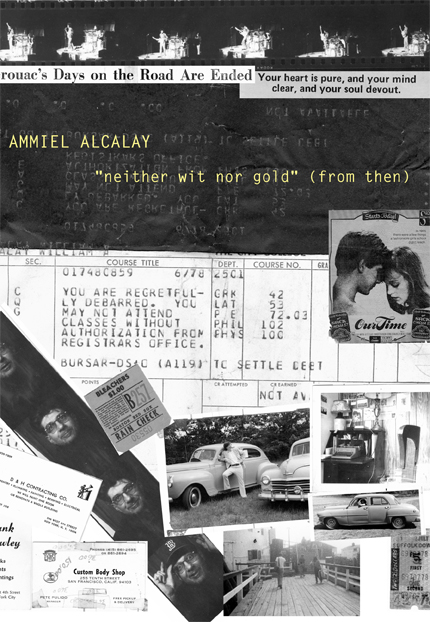His books are a tool for liberation.
Peter Lamborn Wilson

neither wit nor gold (from then)
Ammiel Alcalay
April 2011
While putting together a manuscript of work written between 1975-1990, Alcalay became dissatisfied with the notion of a “selected poems.” As a response, he began to comb through photographs, correspondence, memorabilia, journal entries, and newspaper clippings from the era, and incorporated them into his book; the result is a personal investigation into the relationships of context to text, memory to nostalgia, and present attention to the multiple traces of the past.
About the Author
Ammiel Alcalay grew up in Boston and, as a child, spent time in Gloucester where family friends included Charles Olson and Vincent Ferrini. As a teenager, through the Grolier and Temple Bar Bookshops in Cambridge, he befriended many poets, including John Wieners. Poet, translator, critic, scholar and activist, he teaches at Queens College and the CUNY Graduate Center. His books include Scrapmetal (2006); From the Warring Factions (2002), a book length poem dedicated to the Bosnian town of Srebrenica; Memories of Our Future: Selected Essays (1999); After Jews and Arabs (1993), and the Cairo Noteboooks (1993). His translations include Sarajevo Blues (1998) and Nine Alexandrias (2003) by the Bosnian poet Semezdin Mehmedinovic, Keys to the Garden (1996), and a co-translation (with Oz Shelach), of Outcast by Shimon Ballas (2007). A new book of essays, A Little History, is due out in 2011. Islanders, a novel, came out in 2010. Along with Anne Waldman and others, he was one of the initiators of the Poetry Is News Coalition, and organized, with Mike Kelleher and Fred Dewey, the OlsonNow project. Most recently, through the PhD Program in English and the Center for the Humanities at the CUNY Graduate Center, he initiated Lost & Found: The CUNY Poetics Document Initiative, a series of student and guest edited archival texts emerging from the New American Poetry.
Praise
Ammiel Alcalay is that rare thing—a gifted prose writer and poet, an accomplished intellectual and a true, as well as inventive, comparatist.
Edward Said
His books are a tool for liberation.
Peter Lamborn Wilson
He approaches his experience as if it were somebody else’s. He takes h is own poetry, his own notebooks, and his own diaries as documentary evidence of another person’s life and therefore presents them as the index of a different, never-quite-forgotten world.
David Kaufmann, The Tablet
Alcalay is at his most telling when he poses the possibilities of these counter-collaged memories meeting and creating another kind of consciousness, a third eye on a distant landscape coming into zoom focus, or, like Jack Spicer’s poet as radio, radiating poems as messages (radio waves)coming in at different frequencies, frequenting multiple dimensions.
Benjamin Hollander
What the format and the content lays out is a life, filled with poetry and music, work, frenzy, scribbles, reportage and so much more. There’s a great narratological power in the fact that the book’s point of entry is not the first page, but any page.
Jake Marmer
[E]xamination of Professor Alcalay’s work reveals the fascinatingly creative ways in which personal photographs, archival images are used to recover memories, provoke ideas and illuminate imaginations.
Spinning Head blog
In the News
Publication Details
ISBN: 978-1-933254-84-5
Trade Paperback
Perfect-bound. 88 pp, 6 x 8.75 in
Publication Date: April 01 2011
Distribution: SPD
Series: Dossier